Why the UAE Remains the Gateway to Global Business
The United Arab Emirates continues to stand out as one of the most business-friendly and strategically positioned countries in the world. With 100% foreign ownership in Freezones, simplified company registration, competitive tax structures, and easy access to global markets, the UAE has solidified its status as a preferred destination for investors, entrepreneurs, and international companies alike.
That said, the journey to setting up a business here isn’t always straightforward, especially if you’re unfamiliar with how the system works. This is where our guide—and Evolve Consultancy—come in. With more than 25 years of hands-on experience and a team that includes ex-Freezone professionals, we’re here to make the process clear, efficient, and stress-free from day one.
Understanding the UAE Business Landscape
The United Arab Emirates is made up of seven Emirates: Dubai, Abu Dhabi, Sharjah, Ajman, Umm Al Quwain, Ras Al Khaimah, and Fujairah. Each one operates its own set of licensing authorities and Freezones, all with different regulations, facilities, and pricing models tailored to various industries and business needs.
As an investor or entrepreneur looking to set up in the UAE, you’ll typically choose between three main types of company structures:
- Mainland Company – Licensed by the Department of Economic Development (DED) in each Emirate, this option gives you full access to trade across the entire UAE without restrictions.
- Freezone Company – Licensed by Freezone Authorities, this structure allows for 100% foreign ownership and is ideal for international or online businesses. However, direct trade within the UAE mainland requires a local distributor or agent.
- Offshore Company – These are non-resident companies primarily used for holding structures or international business activities conducted outside the UAE. Offshore setups don’t require a physical office and are not eligible for local trade or residency visas.
Choosing the right structure is the foundation for how your business will operate, scale, and remain compliant in the UAE.
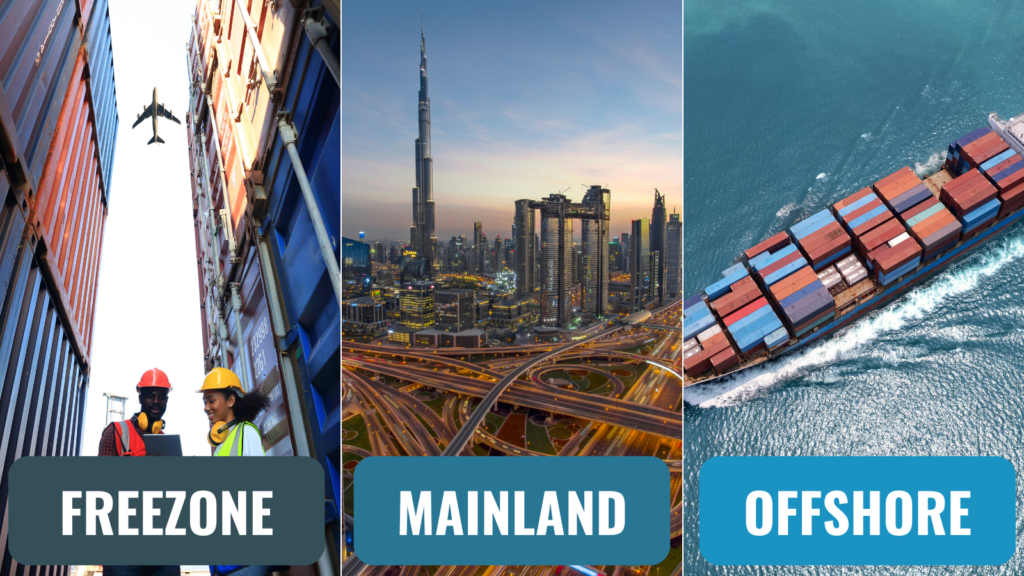
Freezone vs Mainland vs Offshore: Which One is Right for You?
Freezone
Setting up a Freezone company in the UAE remains one of the most attractive options for foreign investors. It grants 100% foreign ownership, making it ideal for entrepreneurs who want complete control without a local sponsor.
Freezones are especially appealing to businesses involved in international trade, professional services, or remote operations. They’re known for streamlined processes, and many offer quick setup options that bundle in essentials like office space and visa packages.
That said, a key limitation is market access. Freezone companies cannot trade directly with the UAE mainland unless they partner with a licensed distributor. If your business is geared toward international markets or operates largely online, a Freezone setup offers efficiency, independence, and scalability.
Mainland
A Mainland company offers the most flexibility when it comes to operating within the UAE. It allows full access to the UAE market, meaning you can trade freely across all Emirates without needing a local distributor.
Thanks to recent regulatory changes, 100% foreign ownership is now permitted for most business activities, removing one of the biggest historical barriers for international entrepreneurs.
To set up a Mainland business, you’ll need to lease a physical office space—a minimum of 200 sq. ft., which must be Ejari-registered. All Mainland companies are regulated by the Department of Economic Development (DED) in their respective Emirates, which oversees licensing, approvals, and legal compliance. For businesses that want a physical presence and unrestricted market access within the UAE, Mainland is often the most strategic route.
Offshore
An Offshore company is a different kind of structure altogether—designed for international business, not for operations within the UAE.
Offshore setups are typically used for purposes like holding companies, intellectual property ownership, or cross-border trade. These entities are not eligible for residence visas, and they do not require an office or physical presence in the UAE.
It’s important to note that Offshore companies cannot access the UAE market and are not permitted to engage in local commercial activities. However, for investors seeking a flexible structure for global expansion, asset protection, or tax-efficient planning, they can be a smart solution.
Which is best?
It all comes down to your business model. Freezones are ideal for simplicity, fast setup, and 100% foreign ownership. Mainland companies offer the ability to scale and trade across the UAE without restrictions. Offshore structures are best for global operations and strategic structuring. At Evolve Consultancy, we guide you through every option to ensure your setup matches your vision and goals.
UAE Freezones Allow 100% Foreign Ownership for All Activities
One of the standout advantages of launching a business in a UAE Freezone is the ability to retain 100% foreign ownership. This means you don’t need a local partner, you won’t have to share ownership or give up any equity, and you maintain full control of your company—with the added benefit of profit repatriation.
That said, while all UAE Freezones allow 100% foreign ownership, each Freezone has its own scope of permitted business activities. It’s crucial to choose one that aligns with your company’s industry, operations, and future growth plans.
Some of the most popular Freezones that support a wide range of activities include:
- Jebel Ali Free Zone (JAFZA) – Dubai
- Dubai Multi Commodities Centre (DMCC)
- Sharjah Airport International Freezone (SAIF)
- Ras Al Khaimah Economic Zone (RAKEZ)
- Ajman Freezone
- Umm Al Quwain Free Trade Zone (UAQ FTZ)
- Abu Dhabi’s twofour54, Masdar, and KEZAD
- Hamriyah Freezone (HFZA)
Each of these zones specializes in certain sectors—whether it’s media, logistics, technology, manufacturing, or trade—so even though the ownership rules are clear, the license types and permitted activities may differ.
At Evolve Consultancy, we take the guesswork out of the equation and guide you to the Freezone that not only grants you 100% control but also fully supports your business model and long-term goals.
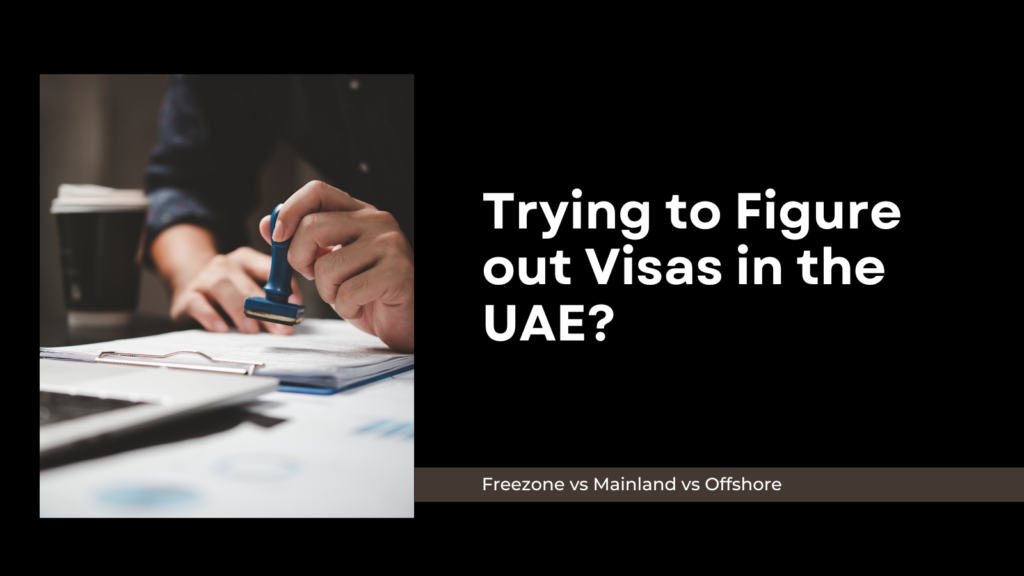
Visa Allocation: How Many Can You Get with a Freezone Company?
When you set up a Freezone company in the UAE, one of the most practical considerations is how many residency visas you’re eligible to apply for. Your visa quota isn’t fixed across all Freezones—it depends on a few key variables, including your office setup, the nature of your business, and the internal policies of the Freezone Authority you’re working with.
1. Office Space
For instance, in JAFZA, a widely followed guideline is 1 visa per 9 square meters of office space. However, not all Freezones use the same calculation. Many offer pre-defined visa packages—for example, a shared workstation might come with 1 or 2 visas, while private offices may unlock more depending on the size.
If you need more staff, upgrading your office can often increase your visa quota, especially in space-based systems.
2. Business Activity
The type of business you’re operating also influences how many visas you can apply for. Companies in labor-heavy sectors—like logistics, manufacturing, or cleaning services—often qualify for higher visa allowances. In contrast, a consultancy, media agency, or freelance business may start with a smaller allocation, usually around 1 to 3 visas.
3. Freezone Authority Policy
Every Freezone Authority sets its own visa guidelines. Some are highly structured with packages tied to specific facilities, while others assess on a case-by-case basis. In many cases, it’s possible to request a visa quota increase by providing justification—like business growth, client contracts, or team expansion plans.
Note: There’s no one-size-fits-all number, but most new businesses in Freezones start with 1 to 3 visas. The best way to plan is to speak with an experienced consultant—like Evolve Consultancy—who can help you choose the right Freezone and setup based on your space and staffing needs.
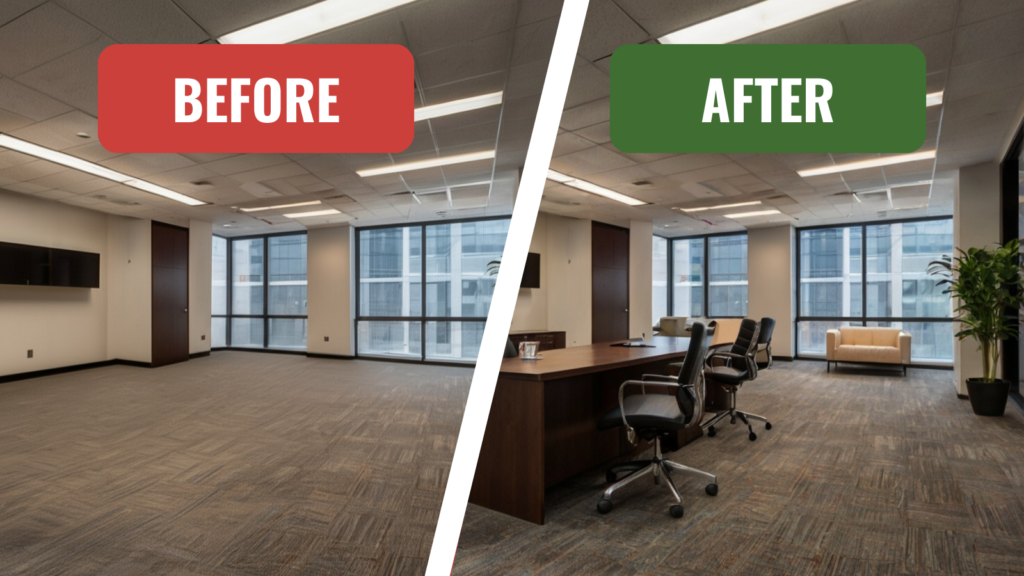
We assisted one of our clients in acquiring this office space and later supported the full fit-out process, as shown above.
Minimum Office Space Requirements for UAE Mainland Business Setup
If you’re setting up a Mainland business in the UAE, securing a physical office space isn’t just a formality, it’s a legal requirement. Unlike Freezone setups, virtual offices are not permitted for businesses licensed under the Department of Economic Development (DED).
To remain compliant and qualify for operational approval and visa allocation, here’s what you’ll need:
Key Requirements:
- Minimum Space: You must lease an office of at least 200 sq. ft. (approximately 18.5 sqm).
- Visa Quota: The general rule is 1 visa per 9 sqm. of leased space, though this may vary slightly by Emirate (varies depending on size, structure and which freezone or Emirate).
- Ejari Registration: In Dubai, your lease must be registered through the Ejari system, which links tenancy contracts to regulatory databases.
- Municipality Inspection: Your office must pass a zoning and usage inspection by the local municipality to ensure it’s suitable for your licensed activity (this also depends on the activity).
Tip: The location of your office can affect not just approval timelines, but also accessibility for staff and clients, as well as your future ability to scale. At Evolve Consultancy, we help you secure an office that ticks all the compliance boxes—and supports your business growth from the start.

What Are the Approximate Updated Costs for Business Licenses Across the Emirates?
Dubai
- Commercial License: AED 10,000–35,000
- Professional License: AED 5,000–10,000
- Industrial License: AED 15,000–25,000
- Freelance Permit: AED 7,500–15,000
- Estimate of a Typical Full Setup: AED 10,000–60,000 depending on package, office size, location, jurisdiction and visa requirements (Prices may vary depending on the factors mentioned)
Abu Dhabi (ADGM – Abu Dhabi Global Market)
- Non-Financial License: AED 20,200 (previously AED 36,700), with renewals at AED 18,350
This significant fee reduction reflects ADGM’s push to attract more non-financial businesses by making it easier and more affordable to enter the market (Note that all prices are estimates).
- Retail License: AED 9,175 to start, with renewals at AED 7,340
Other Emirates & Mainland (Sharjah, Ajman, Umm Al Quwain, Ras Al Khaimah, Fujairah)
- Freezone packages: AED 5,000–20,000
- Mainland setup (In General): AED 15,000–100,000
Key Differences
- Dubai offers high visibility, premium infrastructure, and globally recognized Freezones—but at higher costs.
- Abu Dhabi (ADGM) is positioned in the high to medium range, offering top-tier credibility with slightly more accessible pricing than Dubai, especially for non-financial and retail licenses.
- Sharjah, Ajman, UAQ, Ras Al Khaimah, and Fujairah provide the most cost-effective solutions, making them ideal for startups or businesses focused on affordability.
- Many Freezones bundle license fees with visa quotas and workstation options, offering solid value for lean setups.
Note: These figures are general estimates based on our experience/research, they are not necessarily absolute, and they are the latest estimated published Freezone & Mainland offers as of 2025. Exact fees can vary depending on business activity, office requirements, visa needs, and ongoing government updates or market fluctuations.
These are estimated ranges. Your actual costs will depend on your chosen activity, number of visas, office size, and jurisdiction. Evolve Consultancy provides fully tailored quotations to help you plan accurately and avoid hidden fees ensuring clarity, efficiency and transparency throughout the entire business journey.
Understanding FZE, FZCO and Branch Structures
In setting up a company in a UAE Freezone, you will typically choose between three legal structures:
- FZE (Free Zone Establishment): A single shareholder (company or individual)
- FZCO (Free Zone Company): Two shareholders (individuals, companies, or both) at a minimum
- Branch: Branch of a foreign or a UAE existing company—cannot engage in activities not licensed to the parent
Your structure affects your documentation, liability, and capital requirements. Evolve Consultancy guides clients on the best structure based on ownership, size, and future plans.
JAFZA-Specific Licensing & Facility Costs (Compared to Other Emirates)
JAFZA (Jebel Ali Free Zone) is one of the leading Freezones in Dubai, highly regarded for its advanced infrastructure and direct access to global trade routes. It’s particularly attractive for businesses in logistics, manufacturing, and import/export. Naturally, this comes with a more premium cost structure compared to many other Freezones across the UAE.
Approximate Setup Costs:
- Trading / Industrial License: AED 5,000
- Service License: AED 5,000
- Company Registration Fee: AED 5,000
- Workstation / Office Space: Varies & depends on size and location
- CIC (Computer Immigration Card): AED 2,000
- Refundable Security Deposit: 10% of the facility cost
- Estimated Total Setup Cost: AED 38,000–50,000 (excluding visa fees)
Renewals:
- License Renewal: AED 5,000 (Annually)
- CIC Renewal: AED 2,000
- Office/Workstation Renewal: AED 35,000+ (Annually) depending on size and specifications
While JAFZA’s setup costs are higher than many other Freezones—such as IFZA or SHAMS, where packages can start as low as AED 5,500 to AED 11,900—the added cost reflects its strategic location, government reputation, and high-volume logistics capabilities. For companies with global supply chains or high-growth manufacturing needs, this investment often brings long-term returns.
At Evolve Consultancy, we help you evaluate whether a premium zone like JAFZA makes sense—or if a leaner, cost-effective Freezone is a smarter fit for your goals.
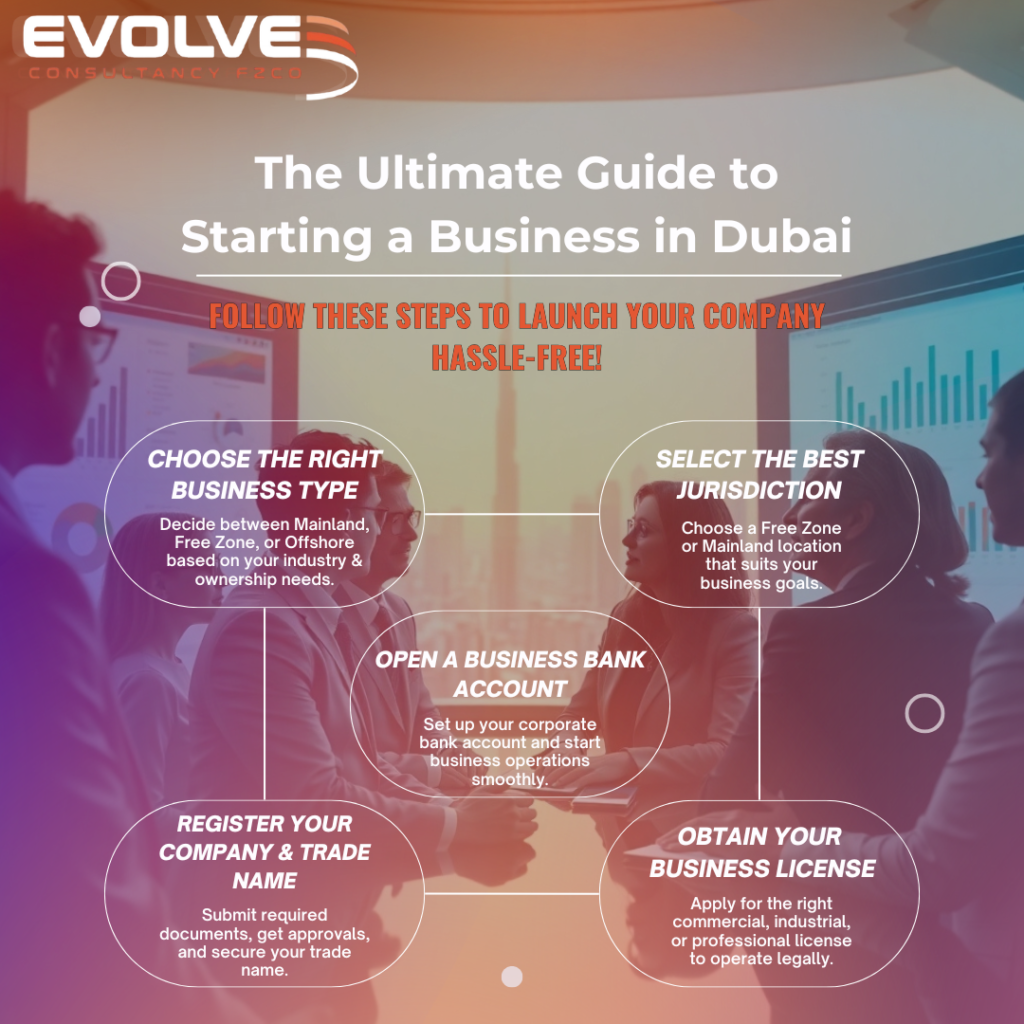
Step-by-Step Company Formation Process in the UAE
Setting up a company in the UAE has several steps that are somewhat different depending on whether you are registering on the Mainland or in a Freezone. Here is a general outline:
Step 1: Choose Your Business Activity
Select the activity your company will engage in—commercial, industrial professional, tourism or agricultural—and confirm which Freezone or Mainland authority supports it. The license type will depend on this choice.
Step 2: Select a Legal Structure
Choosing the right legal structure is critical—not just for ownership, but also for licensing, liability, and taxation. In the UAE, legal structures vary across the Mainland, Freezones, and Offshore jurisdictions, and should match your exact business model.
Common company types include:
- Limited Liability Company (LLC)
- Sole Establishment
- Civil Company
- General Partnership
- Limited Partnership
- Public Joint Stock Company (PJSC)
- Private Joint Stock Company (PrJSC)
- Holding Company
- Local, GCC, or Foreign Branch
- Freezone Establishment (FZE)
- Freezone Company (FZCO)
Step 3: Reserve Your Trade Name
Submit your preferred business/trade name options to the relevant authority for approval. The name must comply with UAE naming standards and be unique to your business.
Step 4: Initial Approval & Ministry of Interior/CID Clearance
At this stage, basic documentation—like passport copies and shareholder details—is submitted to apply for initial approval. In Freezones, this includes forwarding your file for security clearance, which performs a background check on all shareholders. This clearance is typically required before lease finalization and full licensing can proceed.
Step 5: Office Selection & Lease Agreement (If an Office is needed)
Once initial approval is received, you’ll need to secure your office space. This could be a flexi-desk, shared office, or private office, depending on your visa and operational needs. For Mainland setups, the lease must be Ejari-registered (in Dubai) and meet the minimum space requirement, typically 200 sq. ft.
Step 6: Prepare the Memorandum of Association (MOA)
The MOA is a legally binding document that outlines the structure of your business, including shareholder details, capital contributions, business activities, and profit distribution. While it is mandatory for Mainland LLCs, many Freezones also require an MOA—or a similar agreement—depending on your legal structure. The MOA must be signed by all shareholders, and for Mainland entities, notarized by the Notary Public.
Note: For some Mainland businesses that are 100% foreign-owned, an LSA (Local Service Agent Agreement) may be required for regulatory purposes. This does not give the local agent any ownership or financial stake in your company, but it is still a legal requirement. These documents must be prepared and signed through a UAE-licensed law firm, notary public, or court to be valid.
Step 7: Submit Full Documentation
After securing your office and finalizing your MOA (if required), you submit the full set of documents. This includes passport copies, photos, entry permits or visas, your lease agreement, application forms, and the MOA.
Step 8: License Issuance
Once all documents are approved, your business is officially registered, and you’ll receive your license and certificate of incorporation.
Additional note: Register with the Dubai Chamber of Commerce (if applicable)
For many Mainland businesses and some Freezone companies engaged in trading, exports, or logistics, registration with the Dubai Chamber of Commerce is required. This enables your business to issue certified commercial invoices, access trade and export documentation, and build credibility within the UAE’s formal trade network.
Step 9: Visa Processing & Residency
Apply for your Establishment Card (CIC) to sponsor employees. From there, you can begin the residency visa process, including medical testing, Emirates ID registration, and final visa stamping into the passport.
Step 10: Open a Business Bank Account
With your license and documents in hand, you can open a corporate bank account. Most banks take 7–14 business days to complete internal compliance checks and account activation.
Evolve Consultancy handles this entire process on your behalf, preparing documents in a correct manner and expediting approvals preventing any missteps or delays, ensuring your application and setup experience is fast-tracked and hassle-free.
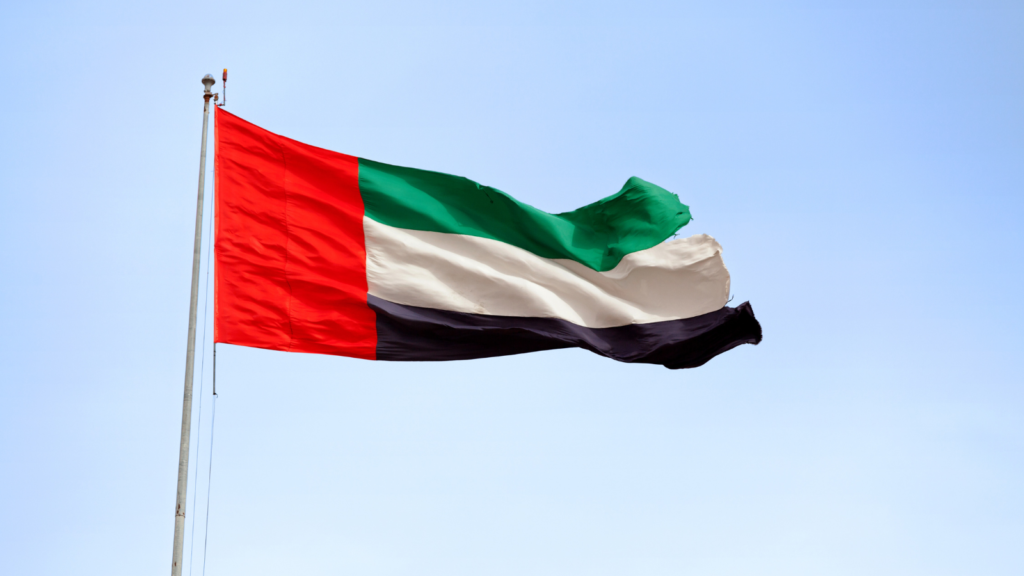
Government Entities Involved in UAE Company Formation
There are different UAE government authorities that are involved in the business setup. It is necessary to know them to plan and avoid delays.
1. Ministry of Interior & CID (Criminal Investigation Department)
- Conducts background checks on foreign shareholders
- Required for most Freezone and part of Mainland licenses
2. Freezone Authorities / Department of Economic Development (DED)
- Freezones: Oversee licensing, name approvals, activity classification and office allotment
- DED: Manages Mainland business registration, office compliance and approvals
3. GDRFA / ICA (Immigration)
- GDRFA: Oversees visa processing, entry permits, and approval of Emirates ID
- ICA: Freezones federal immigration outside of Dubai
4. MOHRE (Ministry of Human Resources and Emiratisation)
- For Mainland companies only
- Issues labor cards, quotas, and employee contracts
5. Municipality & Notary Public
- Municipality: Oversees inspection and approves office space
- Notary Public: Required for authenticating certain legal documents (only for Mainland)
With Evolve Consultancy, we help minimize delays by ensuring your documents are complete, accurate, and aligned with each authority’s requirements—so when approvals are issued, nothing is holding things up.
Business Setup Timelines and What to Expect
Setting up a company in the UAE typically takes anywhere between 14 to 30 calendar days, depending on your business activity, the jurisdiction you choose (Freezone or Mainland), and how quickly the required documents are processed.
For most Freezone companies, the process can take around 14 to 30 days, provided that all documents are in order and approvals go smoothly. If you’re registering a Mainland company, expect a slightly longer timeline of 21 to 30 days due to added steps like site inspections and coordination with MOHRE.
Several factors can influence how quickly things move. Delays often occur when CID or immigration approvals take longer than expected, when documents are missing—such as a lease agreement, passport copy, or NOC—or when the chosen business activity requires extra layers of external approval.
At Evolve Consultancy, our role is to keep everything moving. We make sure your application is complete before it’s submitted, stay on top of every stage of government review, and keep you informed every step of the way. You’ll always know what to expect, how long it will take, and what to prepare for—so you can avoid unnecessary holdups.
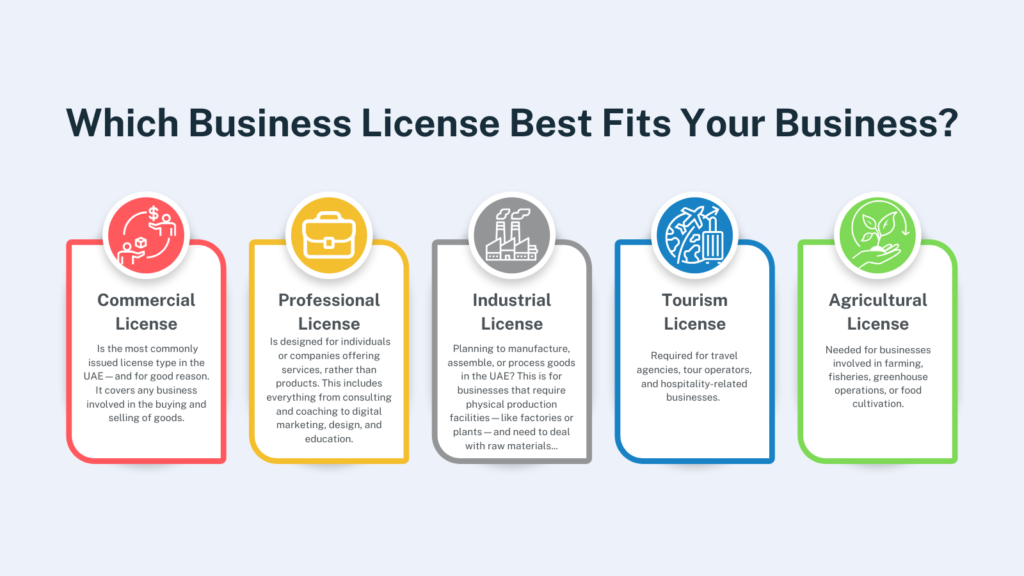
Types of Business Licenses in the UAE
When setting up your company in the UAE, choosing the right business license is one of the most important decisions you’ll make. Your license defines what activities you’re legally allowed to carry out—and choosing the wrong one could limit your ability to operate, scale, or even get approved. Here’s a breakdown of the four main license types in the UAE, and what they actually cover in practice:
Commercial License
A Commercial License is the most commonly issued license type in the UAE—and for good reason. It covers any business involved in the buying and selling of goods.
Whether you’re opening a retail shop, launching an e-commerce brand, trading wholesale goods, or importing and exporting products globally, this is the license you’ll need.
Some Examples of what it covers:
- Retail stores (fashion, electronics, beauty, etc.)
- E-commerce platforms
- Wholesale and distribution
- Import/export businesses
- General trading (if specified in the license)
It’s a flexible option that suits everyone from solo traders to large-scale product-based businesses.
Professional License
A Professional License is designed for individuals or companies offering services, rather than products. This includes everything from consulting and coaching to digital marketing, design, and education.
Commonly Ideal for:
- Consultants (business, legal, financial, IT)
- Freelancers and creatives (designers, marketers, writers)
- Technical services (IT, engineering, training)
- Service agencies (advertising, HR, media)
This license allows 100% foreign ownership and is often used by service providers who want to work with clients locally and internationally.
Industrial License
Planning to manufacture, assemble, or process goods in the UAE? You’ll need an Industrial License. This is for businesses that require physical production facilities—like factories or plants—and need to deal with raw materials, machinery, or labor-intensive operations.
Example of activities covered:
- Manufacturing plants
- Food and beverage production
- Textile, metal, or electronics assembly
- Packaging and bottling operations
Industrial licenses often come with additional regulatory steps, including environmental approvals, zoning clearance, and inspections.
Freelance Permit
The Freelance Permit is ideal for solo professionals looking for flexibility and low overhead. It allows you to work as an independent contractor under your own name, without the need for a full business setup.
Common use cases:
- Writers, photographers, and designers
- Developers, coders, and UI/UX specialists
- Coaches, trainers, and consultants
- Remote workers or digital nomads based in the UAE
Tourism License
Required for travel agencies, tour operators, and hospitality-related businesses. Usually issued by the Department of Tourism or approved Freezones.
Agricultural License
Needed for businesses involved in farming, fisheries, greenhouse operations, or food cultivation.
In general, the UAE offers thousands of activities to choose from, Evolve Consultancy helps you identify the right license based on your goals, visa needs, and business model. Choosing the wrong one can result in costly delays or limitations.
Mainland vs Freezone Company Setup – Key Differences
Deciding between a Mainland and Freezone company setup in the UAE depends on your business goals, operational needs, and target market. Here’s a clear breakdown to help you weigh your options.
In terms of ownership, both options now allow 100% foreign investment. Freezones have always offered full ownership for all permitted activities, while Mainland companies can now also be fully foreign-owned in most sectors—though a few services may still require a local service agent.
Market access is where the two structures differ more significantly. A Freezone company is primarily allowed to operate within its own zone or internationally. To sell directly within the UAE Mainland, a Freezone entity must appoint a local distributor. In contrast, a Mainland company has unrestricted access to the UAE market, including the ability to work directly with government entities.
When it comes to office requirements, Freezones tend to be more flexible. Most allow flexi-desks or shared office setups, and visa quotas are typically linked to the size of the workspace. Mainland companies, however, are required to lease a physical office with a minimum of 200 sq. ft., which must be Ejari-registered (in Dubai).
Setup time and cost is another differentiator. Freezones usually offer faster setup, pre-packaged solutions, and lower initial costs, making them ideal for startups and lean teams. Mainland setups can take slightly longer and often involve higher office rental costs, but they offer greater long-term flexibility and local credibility.
Finally, each is governed differently. Freezone companies are regulated by their respective Freezone Authorities, while Mainland companies fall under the Department of Economic Development (DED) and broader UAE commercial laws.
At Evolve Consultancy, we help you evaluate all these factors based on your budget, visa needs, and commercial goals—so you can move forward with the structure that sets your business up for success from day one.
Understanding Visa Quotas, Office Sizes, and Their Impact
In the UAE, your visa quota depends on several variables—including the Freezone’s internal rules, the size and type of office you lease, and your specific business activity. While some Freezones, such as JAFZA, use a general benchmark of 1 visa per 9 square meters, this isn’t a universal rule. Other zones may offer fixed visa bundles or assign quotas independently of office size. Basic workstation packages often allow for just 1 or 2 visas.
There is some flexibility in the system. Many Freezones let you apply for quota increases if you can justify the need—such as growing your team or expanding operations. Upgrading to a larger office can also unlock additional visas. For Mainland companies, quota adjustments are typically handled through MOHRE, the Ministry of Human Resources and Emiratisation.
Additional factors can also influence how many visas you’re granted. These include the nature of your business, the number of employees you need, and how quickly entities like CID and immigration complete their clearance processes.
At Evolve Consultancy, we work closely with each Freezone Authority to align your visa plan with their exact criteria—so you’re well-prepared, compliant, and set up for success from the start.

Costs and Considerations When Choosing an Emirate
The Emirate you choose for your business setup in the UAE plays a major role in determining your licensing costs, visa quotas, facility expenses, and long-term growth potential. Although all jurisdictions operate under UAE federal law, each Emirate has its own Freezones, cost models, and business incentives that can influence your decision.
Starting with Dubai, it’s known for high visibility and premium infrastructure, which naturally comes with higher licensing and office costs—particularly in Freezones located in central commercial areas. For businesses that prioritize global reach and brand positioning, the investment can be well worth it.
In Abu Dhabi, Freezones like KIZAD, Masdar City, and twofour54 cater to industries ranging from manufacturing and clean energy to media and content creation. Abu Dhabi Global Market (ADGM), in particular, has become a go-to hub for financial and professional services, and it offers reduced registration and renewal fees aimed at attracting global firms.
If you’re looking for more cost-effective options, Freezones in Sharjah, Ajman, Umm Al Quwain, Ras Al Khaimah, and Fujairah are known for their competitive pricing. For example, Hamriyah Free Zone Authority (HFZA) in Sharjah offers highly competitive setup costs and is especially attractive for businesses in industrial manufacturing, logistics, and warehousing, with easy access to ports and flexible land lease options. Zones like RAKEZ, Ajman Freezone, UAQ FTZ, and Fujairah Creative City offer attractive packages for startups and small businesses, with lower setup and facility costs yet still grant businesses with the efficiency and ease of operations they are looking for.
Office and workstation pricing also varies significantly. In Dubai, executive offices and even flexi-desks can be priced at a premium, especially in top-tier zones. In contrast, the other Emirates offer more affordable office packages—a major advantage if you’re looking to manage overheads. Keep in mind, visa quotas are often tied to the size and type of facility you lease, so this decision impacts more than just cost.
Another important consideration is sector specialization. Choosing a Freezone that aligns with your business activity can simplify licensing and reduce regulatory friction. For example, JAFZA is ideal for logistics and trading companies, while twofour54 is designed specifically for media and creative businesses.
Lastly, some Emirates roll out incentive programs such as seasonal fee reductions, visa bundles, or installment payment plans. These offers change frequently and can be missed if you’re not actively monitoring them.
At Evolve Consultancy, we don’t just compare costs—we help you evaluate which Emirate offers the best combination of value, industry fit, visa flexibility, and scalability for your business model.
How to Choose the Right Freezone for Your Business
There are over 40 Freezones in the UAE, each offering its own set of benefits, pricing models, and industry specializations. Choosing the right one is a key decision that can impact your company’s long-term success.
Business activity compatibility is one of the first things to look at. Every Freezone is limited to specific licensed activities. For instance, JAFZA is tailored toward manufacturing and logistics companies, while twofour54 caters to media and production businesses. Trying to operate outside the approved scope can cause delays or even licensing restrictions.
Your visa requirements and facility preferences also matter. Some Freezones provide bundled startup packages that include 1–2 visas with a shared office or flexi-desk. Larger office facilities, on the other hand, offer more flexibility to accommodate future team growth.
You should also evaluate the reputation and efficiency of the Freezone. Well-established zones like JAFZA, KIZAD, DMCC, HMFA (Hamriyah Freezone Authority) RAKEZ, and IFZA are known for their streamlined processing and solid customer support.
Expansion flexibility is crucial if you plan to scale. Many Freezones allow you to upgrade your office space, add new business activities, or even convert to a Mainland license down the line—giving your business room to grow beyond its initial model.
Finally, consider the business ecosystem. A Freezone that offers coworking spaces, networking opportunities, and shared services can be incredibly valuable, especially for tech startups, creative professionals, and consultants.
At Evolve Consultancy, we help you compare and shortlist the right Freezones based on your business activity, visa requirements, growth plans, and budget—ensuring you launch in a zone that can grow with you.
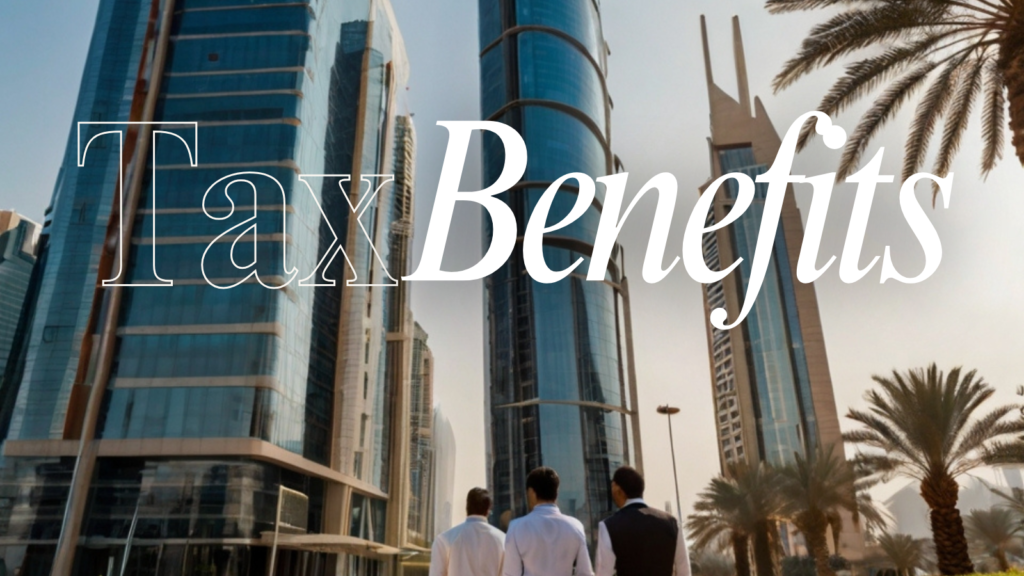
Freezone Tax Benefits and Compliance Requirements (Explained Simply)
One of the biggest reasons people choose to open a company in a UAE Freezone is because of the 0% corporate tax on certain types of income. That’s right—you might not pay any corporate tax at all if your business qualifies. But to keep that benefit, you need to follow a few rules.
0% Corporate Tax—But Only on Qualifying Income
You don’t automatically get a 0% tax on everything your company earns. The 0% rate only applies to what’s called qualifying income. This usually means:
- Money you earn from doing business inside the Freezone
- Or money you make from clients outside the UAE, like exports or international services
If your Freezone company starts selling directly to customers in the UAE Mainland, that income is usually treated as non-qualifying—and taxed at 9%.
What’s Non-Qualifying Income?
Think of it this way: Freezones were created to support international trade, tech, logistics, consulting, and remote services. If you stay within that scope, your income is considered “qualifying.”
But if you go outside the rules—like selling goods directly to customers on the Mainland, or doing business you’re not licensed for—that’s non-qualifying income. And the government says: “Cool, but you need to pay tax on that.”
Economic Substance Requirements (aka “You Have to Be Real”)
To enjoy tax benefits, your company needs to be a real, active business—not just something on paper. That means:
- Having an actual office in the UAE (not just a P.O. box)
- Hiring staff or contractors (not just your name on a license)
- Spending money on operating (like rent, salaries, or services)
If your company isn’t “substantial,” it may not qualify for the 0% tax rate—even if it’s in a Freezone.
The De Minimis Rule (Don’t Cross the Line)
There’s a rule to protect the system from being abused. If more than 5% of your total income, or over AED 5 million, comes from non-qualifying activities (like direct Mainland trade), you lose your 0% tax benefit for the year—and possibly for the next five years too.
So it’s important to track where your income comes from and stay within the qualifying limits.
What Is DMTT? (And Does It Affect You?)
Starting in 2025, the UAE is introducing something called the Domestic Minimum Top-Up Tax (DMTT). It’s part of global tax reforms, and it only applies to very large companies—specifically, multinational groups making over €750 million in global revenue.
The goal? To make sure these big companies are paying at least 15% tax worldwide, no matter where they operate.
But here’s the good news:
If you’re a small or medium-sized business in a Freezone, this rule doesn’t affect you at all.
At Evolve Consultancy, we help you structure your business the right way from the start. We’ll make sure your income qualifies for 0% tax, your company meets all compliance rules, and you don’t accidentally lose the benefits you worked hard to get.
Conclusion: Beginning Your UAE Business with Clarity and Confidence
From Freezone and Mainland setups, through visa quotas, types of licenses, and each Emirate’s specific regulations, this guide has walked you through everything you need to know about establishing a business in the UAE. You’ve seen how facilities, timelines, tax benefits, and government approvals all impact your setup, and why your Freezone or Emirate choice is as crucial as your business idea.
You have also seen how prices vary from one Emirates to another, how visas are allocated, and what is required to get your company registered efficiently and legally. Above all, you now see the value in having people with insider knowledge working for you—like Evolve Consultancy with 25+ years’ experience and former-Freezone personnel on board.
In the end, establishing a business in the UAE is not complicated anymore—when clarity is your guide, experience is your ally, and a doer is your partner.
Are you ready to set up your UAE business with confidence that you’re doing it right? Contact Evolve Consultancy Now!
”Disclaimer: The information and cost figures in this guide are based on estimates and Evolve Consultancy’s 25+ years of UAE business setup experience/research. Actual requirements and fees may vary depending on government regulations, market conditions, and the policies of individual Freezones or Mainland authorities. For the most accurate and up-to-date information, we recommend contacting Evolve Consultancy or consulting the relevant government body directly.”
Must-Know FAQs for UAE Business Setup
Get answers to the most common questions about starting your business in the UAE
Yes, you can. All Freezones in the UAE offer 100% foreign ownership for permitted activities. Most Mainland activities also allow full foreign ownership today, thanks to updated commercial laws.
However, certain sectors—usually those related to national interest or specific regulatory bodies—may still require you to appoint a local service agent. In these cases, the agent doesn’t hold any shares in your company and simply acts as a facilitator.
On average, the process takes between 14 to 30 calendar days.
Freezone setups are generally faster, especially if all your documents are ready and your business activity is straightforward. Mainland setups may take slightly longer due to office inspections and coordination with additional government departments like MOHRE.
Visa requirements can also influence the total timeline.
To get started, you’ll need:
- Your passport copy
- A recent personal photo
- Proof of UAE entry (like a visa page or entry stamp)
- A list of proposed trade names
- Evidence of office space—whether that’s a flexi-desk, shared office, or private space
Some business activities may require extra paperwork, such as a business plan or third-party approvals, depending on the license type and industry.
After your business is registered, there are a few recurring costs to keep in mind. These include:
- Annual license renewals
- Office or flexi-desk renewals
- The Computer Immigration Card (CIC) renewal
- Visa renewals for you and any employees you sponsor
The exact figures depend on which Emirate and Freezone you’re in, as well as the size and structure of your company.
While it’s possible to set up a business on your own, working with a consultancy like Evolve saves you time, avoids costly errors, and speeds up the entire process.
With over 25 years of experience and a team that includes former Freezone professionals, we know how to navigate the system efficiently. From selecting the right setup to preparing documents and securing approvals, we handle it all—so you can focus on launching and growing your business.
Not automatically. To be considered a UAE tax resident, you need:
- A valid residence visa
- Proof of living in the UAE
- A substantial business presence
A license alone does not qualify you.
Ready to Start Your UAE Business Journey?
Get expert guidance from our team with over 25 years of experience in UAE business setup.
Contact Evolve Consultancy Today →
